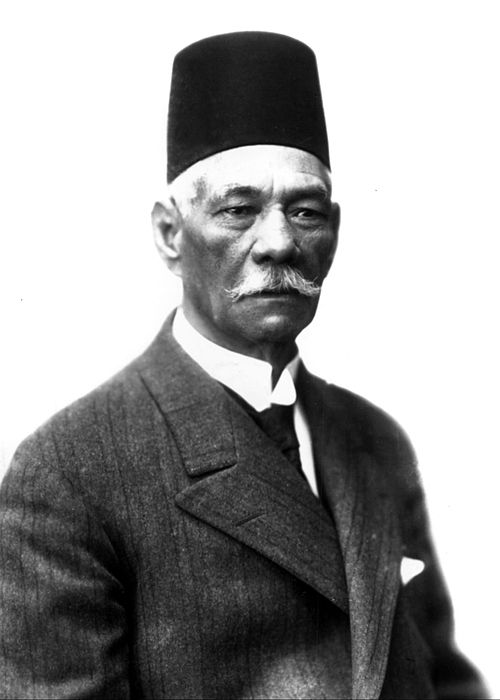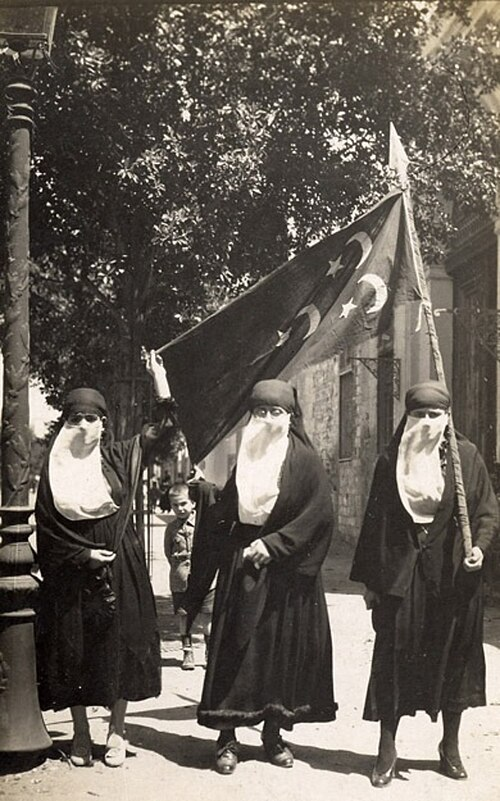IB Syllabus focus:
'Analyze the post–World War I situation in Egypt, covering topics such as nationalism, the emergence of the Wafd Party, the Declaration of Independence, and British influence.'
In the aftermath of World War I, Egypt entered a period of intense political, social, and national transformation. The following notes delve into the details of Egypt's journey through nationalism, the rise of political parties, and the struggle against British dominion.
Nationalism in Post-War Egypt
Emergence and Intensification:
With the armistice, Egyptian nationalists intensified their demands for independence.
The war had mobilised national sentiment, exposing the population to ideas of self-governance and self-determination.
Influences on Nationalism:
The inflation caused by wartime expenses led to widespread economic distress, fuelling nationalist sentiments.
The circulation of Wilsonian principles post-1918 inspired Egyptians to question colonial rule and seek national sovereignty.
Intellectual movements, proliferated through universities and press, disseminated ideas that galvanised the populace.
The Wafd Party
Formation and Ideology:
The Wafd Party, formed in 1919, rapidly became the embodiment of Egyptian nationalist aspirations.
Led by Saad Zaghloul, the Wafd called for complete autonomy, advocating for a constitutional liberal democracy.

Portrait of Saad Zaghloul, the Wafd leader whose arrest in 1919 helped trigger mass protests and whose popularity shaped interwar Egyptian politics. The image reflects his central role in negotiations and electoral politics under the 1923 constitutional framework. Source
Mass Mobilisation:
The party's adept use of mass media allowed it to galvanise widespread support.
Despite British suppression, the Wafd organised large-scale demonstrations and non-cooperation movements.
The 1919 Revolution
Genesis and Public Outcry:
The 1919 Revolution was triggered by the deportation of Saad Zaghloul and other nationalist leaders.
This event unified various social classes under the nationalist banner, leading to nationwide protests.
The Role of Women: Women played a pivotal role, participating in protests and strikes, marking a shift in gender dynamics within the national movement.

Women demonstrators march during the 1919 Egyptian Revolution, a mass uprising that cut across class and gender lines. Their participation broadened the social base of nationalism and helped legitimize demands for constitutional government and independence. Source
The Unilateral Declaration of 1922
British Strategy: In response to increasing unrest, Britain issued a unilateral declaration granting Egypt limited independence in 1922.
Terms and Limitations:
The declaration maintained British military presence and control over foreign affairs, communications, and the protection of foreign interests and minorities.
Egypt was allowed to conduct its internal affairs, albeit under the watchful eye of Britain.
British Influence After the Declaration
Dominance in Foreign Policy:
Britain's strategic interests, particularly in the Suez Canal, dictated its continued interference in Egyptian politics.
The Suez Canal:
The Canal's significance as a route to India and other colonies meant that Britain was unwilling to relinquish control, ensuring ongoing influence in Egyptian matters.
Wafd Party's Response to British Dominance
Struggle and Diplomacy:
The Wafd alternated between negotiation with the British and rallying nationalist sentiment against foreign control.
Their strategy was to use their substantial support to leverage political concessions from Britain.
Egyptian Society Post-1919
Socio-Economic Developments:
Post-war Egypt saw infrastructural development, such as the expansion of the railway network and educational reforms.
However, these improvements were uneven, with rural areas and lower social classes seeing limited benefits.
Cultural Awakening: The period saw a renaissance in Egyptian arts, with a flourishing of literature, music, and cinema that expressed nationalist themes and cultural pride.
The 1923 Constitution
Creation and Impact:
The constitution was drafted to establish a legislative framework for Egypt's parliamentary monarchy.
It represented a political victory for the Wafd and was a step toward realising their democratic aspirations.
British Interference:
Even with the constitution, British advisors retained significant power in Egyptian governance.
Anglo-Egyptian Treaty of 1936
Strategic Reassessment:
Britain sought to secure its interests in the face of growing German and Italian influence in the region.
Terms of the Treaty:
The treaty partially ended Britain's occupation, except for the Suez Canal Zone.
It also outlined Britain's role in training and assisting the Egyptian military.
World War II and Egypt
Neutral Yet Strategic:
Egypt declared neutrality in World War II but was strategically important to the British, who continued to use it as a military base.
Wartime Developments:
The war had a substantial impact on Egypt's economy, with increased demand for Egyptian cotton leading to economic growth.
Post-War Nationalist Resurgence
Revival of Political Activities:
With the end of World War II, the suppressed nationalist movements found new vigour, demanding the end of British military presence and true independence.
The Wafd's Role:
The Wafd, reinvigorated by the end of the war, led the political charge against British influence, rallying for the evacuation of British troops and the abrogation of the 1936 treaty.
In summary, the period from 1914 to 1945 was a crucible of nationalism, political struggle, and socio-economic transformation for Egypt. The nation's journey was marked by the efforts to cast off the shackles of British influence, striving towards genuine autonomy and the reformation of society. The narratives of these years laid the groundwork for the modern Egyptian state, with echoes of these historical dynamics continuing to resonate in the country's contemporary politics and societal structures.
FAQ
The post-WWI economic conditions in Egypt, characterised by inflation and the economic strain of wartime expenses, significantly contributed to the rise of nationalism. Many Egyptians, especially the urban middle class and rural fellahin, experienced hardship due to price increases and unemployment. This economic distress was compounded by the British cotton monopoly, which prioritised British textile industries over the Egyptian economy. Such conditions led to widespread dissatisfaction with the British occupation, as economic grievances were directly linked to colonial economic policies. The economic turmoil thus provided fertile ground for nationalist rhetoric that blamed the British for Egypt’s economic woes.
Egyptian intellectuals and the press played a pivotal role in the post-WWI nationalist movement by disseminating nationalist ideology and mobilising public opinion against colonial rule. They articulated the grievances of the Egyptian people and framed the nationalist discourse in terms of self-determination and sovereignty. Publications such as "Al-Ahram" and "Al-Balagh" were instrumental in this regard, offering platforms for debate and critique of British policies. Intellectuals like Taha Hussein advocated for educational reform and cultural revival, which not only fostered a sense of national identity but also raised political consciousness, contributing to the widespread support for the nationalist cause.
The 1919 Revolution had a profound impact on the cultural renaissance in Egypt, which unfolded in its wake. It ignited a surge of national consciousness that was expressed through cultural mediums. The revolution inspired a generation of writers, poets, and artists who sought to capture the spirit of Egyptian identity and pride in their work. Literature became a means of political expression, with figures like Naguib Mahfouz depicting the struggle for national identity. Additionally, the increased literacy rate, a consequence of the reformative zeal post-revolution, broadened the audience for this burgeoning cultural output. The period saw a revival of Pharaonic history and Islamic art, emphasising a unique Egyptian culture distinct from colonial influence.
The British response, characterised by a blend of repression and concession, significantly shaped subsequent Anglo-Egyptian diplomatic relations. By initially resisting nationalist demands, Britain fuelled further discontent, leading to uprisings such as the 1919 Revolution. This unrest eventually forced Britain to make concessions, like the unilateral Declaration of 1922, which granted limited independence, and the Anglo-Egyptian Treaty of 1936. However, these measures were often seen as insufficient by nationalists and served to prolong tensions rather than resolve them. The dynamics of confrontation and negotiation established patterns that would persist until the complete withdrawal of British forces in 1956.
The 1919 Revolution marked a seminal moment in Egyptian history, acting as the first mass movement against foreign rule. Its significance lies not only in its immediate political consequences, such as Britain's recognition of Egyptian independence, but also in the social changes it catalysed. It united Egyptians from diverse backgrounds, creating a shared sense of national identity and purpose. Women, too, participated in unprecedented numbers, signalling a shift towards greater gender equality. The revolution thus laid the groundwork for future nationalist movements and set the stage for the eventual end of British colonialism in Egypt.
Practice Questions
The Wafd Party significantly galvanised Egyptian nationalism post-WWI by advocating for self-governance and national sovereignty. Their adept mobilisation of the masses through media and public demonstrations showcased their influential role in Egypt's political arena. Despite British efforts to suppress nationalist movements, the Wafd's persistent diplomacy and negotiation tactics led to the 1923 Constitution and Egypt's unilateral independence in 1922. Their policies fostered a sense of unity and a collective identity among Egyptians, cementing the Wafd's status as a central force in the fight against British dominance and the championing of national interests.
The 1936 Anglo-Egyptian Treaty was a partial victory for Egyptian nationalists as it recognised Egypt's nominal independence and sovereignty. However, the treaty fell short of fully satisfying nationalist goals, as it maintained Britain's military presence in the Suez Canal Zone and allowed for British intervention in Egypt's defence affairs. While it provided a framework for future diplomatic relations and contributed to the professionalisation of the Egyptian army, the treaty's limitations reflected the continued imbalance of power and the pragmatic acceptance by Egyptian leaders of a compromised form of independence to achieve greater autonomy in domestic affairs.

